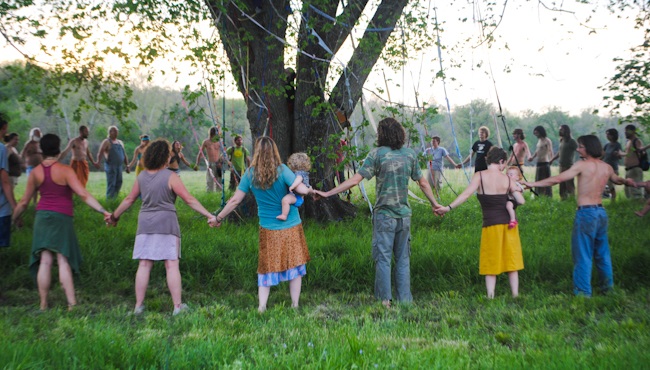New Study Shows Regular Contact with Nature Reduces Crime, Increases Social Cohesion

3rd December 2015
Contributing Writer for Wake Up World
“We need the tonic of wildness… At the same time that we are earnest to explore and learn all things, we require that all things be mysterious and unexplorable, that land and sea be indefinitely wild, unsurveyed and unfathomed by us because unfathomable. We can never have enough of nature.” ~ Henry David Thoreau
The last few hundred years have seen a major shift in man’s relationship with nature. The trend has been a move away from the wild, organic, natural world towards artificial, digital, synthetic, controlled urban environments. With the advent of science during the Age of Enlightenment, man began to grasp that nature operated according to laws that through scientific investigation could be understood, and ultimately controlled and used for the benefit of humanity. The more we were able to explain, the less we perceived nature as a magical, awe-inspiring force that we were an inextricable part of. Humanity began to see itself as superior to nature, and thus a slow disconnection was set in motion — a disconnection that we are gradually beginning to understand has done us a lot more harm than good.
There are an increasing number of studies demonstrating that our relationship to nature is closely tied to our sense of wellbeing. Some of the benefits of being in nature that numerous studies have found so far include: reduced stress, improved mood, increased focus, accelerated recovery and improved sleep. Now, in a new study published by the American Institute of Biological Sciences (November 2015), we can add lower crime rates and increased social cohesion to that list.
In the study conducted by researchers at Cardiff University by Netta Weinstein and others, an international, interdisciplinary team used nationally representative data from the United Kingdom and devised a rigorous model to systematically evaluate the relationships between objective measures and self-reported assessments of contact with nature, community cohesion, and local crime incidence.
According to the report, after accounting for a range of possible factors including socioeconomic deprivation, population density, unemployment rates, socioeconomic standing and weekly wages, the authors concluded that peoples’ experience of nature was responsible for an 8% variation in survey responses regarding their perception of community cohesion. The authors of the study describe this level of variation as, “a striking finding given that individual predictors such as income, gender, age, and education together accounted for only 3%” of the variance.”
The study found a similarly significant relationship with crime rates. According to the study results, access to farmland or green space in a community accounted for a 4% variance in crime rates. Since major social factors that are known to contribute to crime rates, such as socioeconomic deprivation, account for a 5% variance this finding is important. The authors state, “The positive impact of local nature on neighbors’ mutual support may discourage crime, even in areas lower in socioeconomic factors.” Though a four percent variance may seem small, many political programs designed to address crime rates have been established based on variance rates of 2-3%.

When we take into account the findings of this study, it seems dismally ironic that the living environments that are some of the most thoroughly removed from nature are prisons. Correctional facilities are supposed to be places of rehabilitation, yet social scientists are only too aware that periods of confinement generally have the opposite effect; recidivism rates (returning to criminal activity) generally go up rather than down after a jail sentence. This is likely at least in part due to increased levels of alienation and disconnection from both the wider society and the natural world.
With the United States spending more than $80 billion/year nationally on the prison-industrial complex, it is evident that working alternatives need to be explored. Perhaps studies like this one that demonstrate the importance of nature to both crime levels and social cohesion, will help to shift our current approach, so that in the future there is more support for initiatives like the ‘Insight Garden Program’ (IGP), a prison gardening project.
“Incarceration in the US is five times higher than any country in the world. IGP is working to transform the prison system from the inside-out with a proven, replicable curriculum and applied trade in organic gardening. With a less than 10% recidivism rate compared to the U.S. average of greater than 55%, IGP’s success is seen in both the economic reduction of millions in state spending, and in the social benefit of transformed inmates as contributing members in their communities. It is hard to argue or deny the impact IGP has made and is making around the country. This, truly, is the beginning of a new era in prison reform.” ~ Will Hodgman, IGP’s Board Chair
Based on the evidence in this study, similar programs in schools and neighbourhoods could see comparable benefits through prevention of crime, lessening of anti-social behaviour, and heightened levels of community spirit.
One theory as to why nature has such a positive effect on the human psyche is called Attention Restoration Theory (ART) (Kaplan 1995). According to proponents of ART, nature has the ability to act as a re-boot to a depleted mental state. Nature promotes a type of soft focus and serene contemplation that in turn encourages the peaceful alpha brainwaves to dominate our mental state. When alpha brainwaves are dominant the body produces happy, healing neurotransmitters like serotonin, rather than harmful, stress related hormones like cortisol.
When we consider the fact that human evolution has occurred with humans profoundly and intricately immersed in, and dependant on nature, it is no wonder that at a deep level we feel at home and relaxed when we are surrounded by its majestic presence.
It seems that more and more evidence is confirming what hippies, romantics and poets have long been saying. Connection to nature is not just a source of inspiration and beauty, but an essential key to both our individual and collective wellbeing. Hopefully, as this awareness spreads through human consciousness, we will begin to see a shift in the current trend that treats nature as an expendable commodity that can be sacrificed for the sake of wasteful consumption and convenience. By re-establishing a sense of reverence and respect for the awesome forces of nature we will begin to pave the way (or maybe un-pave the way) back towards a healthy, wholesome, loving relationship with ourselves, the natural world, and each other.
Copyright © 2015 Wake Up World.
